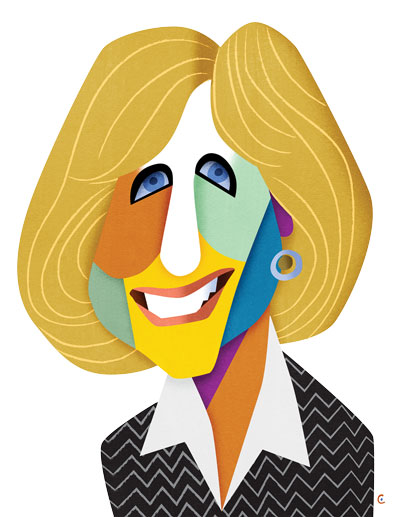Thriving at Work While Introverted
Thriving at Work While Introverted
Embrace who you are, but learn to “sprinkle in” a few of the skills of extroverts,” career consultant Jane Finkle ’86W (Mas) tells self-described introverts.
 As a master’s student, I had an opportunity to work at Rochester’s career center. That was really pivotal. I ended up doing a career discovery group, and it just generated such excitement and energy.
As a master’s student, I had an opportunity to work at Rochester’s career center. That was really pivotal. I ended up doing a career discovery group, and it just generated such excitement and energy.
After I finished my program at the Warner School, I got a job at RIT, worked there for about nine months, and then was recruited to work at the University of Pennsylvania. I oversaw the Wharton Career undergraduate program, but I came from a family of entrepreneurs, so it was always in the back of my mind to do private practice. I’ve been in private practice for 12 years.
American culture leans toward extroversion. And I think that often leaves introverts feeling left out, invisible, or that they may be overlooked for opportunities or promotions.
There are many successful introverts, but there are a lot of clients I’ve worked with who are introverted and feel they’re at a disadvantage. And it’s unfortunate, because they bring a lot to the world and the workplace.
When I first meet with an introvert, instead of saying, “OK, let’s start working on networking,” or some other skill, I always ask them if they’ve ever thought about what’s good about introversion.
We have a conversation about the qualities of introversion that are important to the workplace. And that shifts their sense of who they are in a more positive direction. It doesn’t mean introverts don’t have to take some new risks. But the message is, “embrace who you are.”
I think an important strength of introverts is that they tend to have an ability to concentrate and dig deep.
That often results in creative thinking. If you take time to really think things through, you may come up with a great solution to a problem that adds value in the workplace.
I think that introverts have to be able to integrate, or “sprinkle in,” as I often say, some extroverted skills.
They don’t have to change who they are, but they do have to learn to speak up, promote themselves, and take initiative. Introverts are sometimes more comfortable behind the scenes. So it’s very important when they’re in a work environment that they keep coworkers and the boss up to date with any tasks, problems, or accomplishments.
Introverts who are just starting their careers, such as new college graduates, often feel they won’t know what to say. How do I introduce myself to a network contact? How should I prepare for an interview?
I think one strategy that works really well for introverts is advanced planning. A lot of introverts don’t enjoy networking, but if they first write a script to introduce themselves, they can use their introvert energy to plan in advance what to say. And often they do just fine with reflection, planning, and practice.
As they go through their careers, introverts should make sure they’re connecting with people.
Sometimes they’re just not aware that they need to spend quality time initiating and building relationships. Maybe things aren’t so great at their job. There are ways to develop themselves outside of that organization, through professional associations, where they might serve on a committee, or a nonprofit, where they could serve on the board. These contacts can prove highly beneficial when looking for new opportunities.
I think social media is a gift to introverts.
They can post articles. They can easily introduce themselves to potential contacts. If they’ve won an award or achieved something special, they can post about it. And they can connect with leaders in their field, all in the comfort of solitude.
Extroverts have special challenges, too.
They tend to think and talk at the same time. Extroverts speak more easily and extemporaneously. But just because you talk a lot doesn’t mean you have the best ideas. I think their challenge is to stop and listen, and to listen a little more mindfully.
Home: Philadelphia
Career consultant; author of The Introvert’s Complete Career Guide: From Landing a Job, to Surviving, Thriving, and Moving on Up (Career Press); creator of the University of Pennsylvania’s Wharton Career Discovery seminar.
On career counseling: “A lot of people come to a career counselor aspiring to some important dream or goal. I think about career counseling as the opportunity to help someone write a new chapter. And hopefully it will be a good ending.”
Advice to new graduates: “Don’t be afraid of asking for help—and continue to use the lifelong career advising and resources offered through the University’s Gwen Greene Center for Career Services, Education, and Connections.”
— Karen McCally ’02 (PhD), May 2019
This article originally appeared in the spring 2019 issue of Rochester Review magazine.


